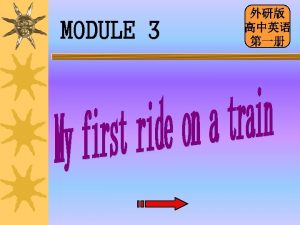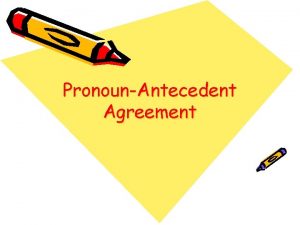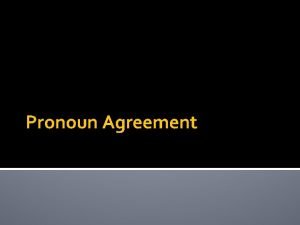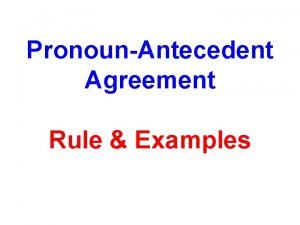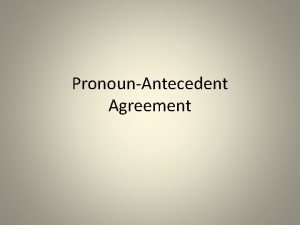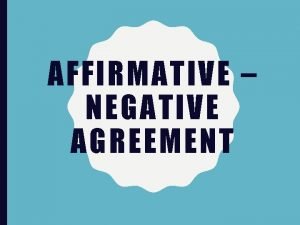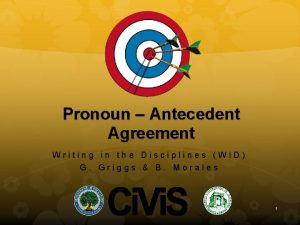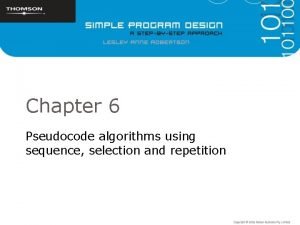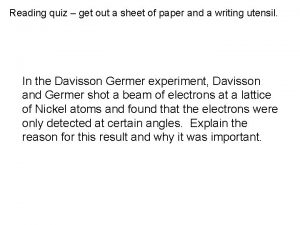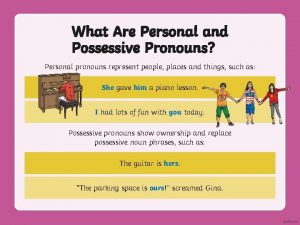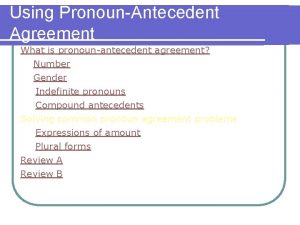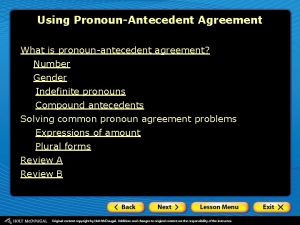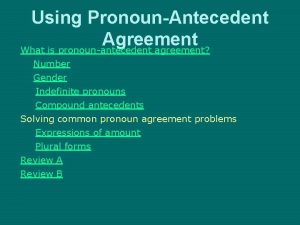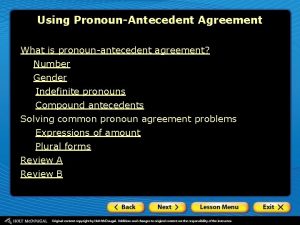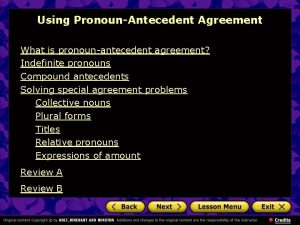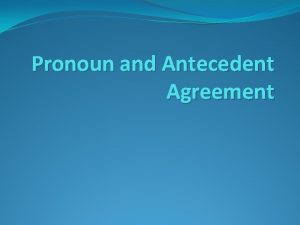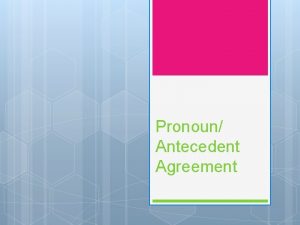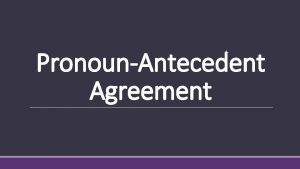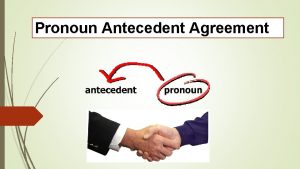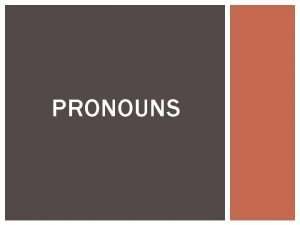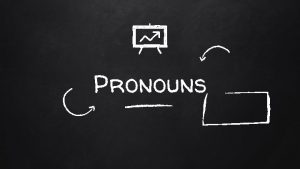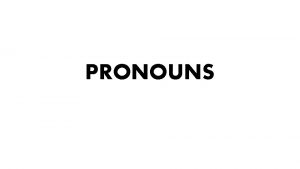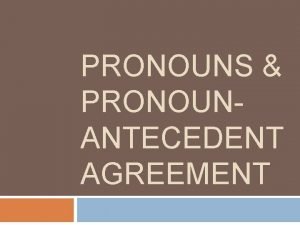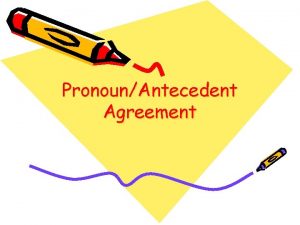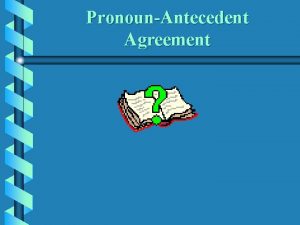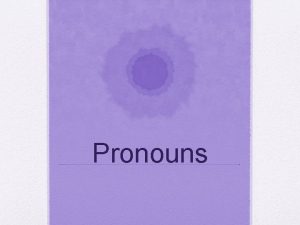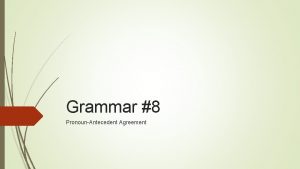PronounAntecedent Agreement What is an Antecedent Pronouns get
























- Slides: 24

Pronoun-Antecedent Agreement

What is an Antecedent? Pronouns get their meaning from the words they stand for; these words are called antecedents. Antecedents are the words that pronouns take the place of later on in the sentence.

How to find an antecedent: 1. Find the pronouns in the sentence 2. Find what the pronouns are renaming- that is your antecedent.

Examples Michael said he lost his watch at the fair. Pronouns: He, his Antecedent: Michael

Examples When the Levines moved, they gave their pets to neighbors. Pronouns: They, their Antecedent: Levines

Examples Attending the Mardi Gras can be tiring, but it can be a lot of fun! Pronouns: It Antecedent: Attending the Mardi Gras

Agreement • Personal pronouns must agree with their antecedents in – gender and in – number

Agreement in GENDER • The gender of a pronoun MUST match the gender of its antecedent!! • Nouns referring to males, such as uncle, boy, and actor, are MASCULINE. • Nouns referring to females, such as aunt, mother, and actress, are FEMININE. • Nouns that do not refer to males or females, such as stone and freedom, are NEUTRAL.

Agreement in NUMBER • Just like subject verb agreement, pronouns and their antecedents MUST agree in number • Number refers to a word being either SINGULAR or PLURAL • Typically it is easy to make pronouns and antecedents agree in number • Ex. Charlene accessed her friend’s Home Page.

Agreement in NUMBER • Where it gets tricky: Compound Antecedents • RULE: Use a SINGULAR personal pronoun to refer to two or more SINGULAR antecedents joined by OR or NOR. • Ex. Neither Keith nor Rob remembers his password.

• RULE: Use a PLURAL personal pronoun to refer to two or more antecedents joined by AND (this makes the antecedent PLURAL!) • Ex. Gene and Rita have checked their e-mail.

Singular Pronouns Masculine • him • his • himself • hisself is NOT a word!!!!! Feminine • she • herself Neutral it, itself

Plural Pronouns • we • us • our, ours • ourselves • they • them • their, theirs • themselves

Beware the “Shift in Person” • RULE: You must not make a “shift in person” in the middle of a sentence • What is shift in person? Becca is studying programming, a course you need for a degree in computer science. Should say “…a course Becca needs…”

When it is Unclear • RULE: When gender is NOT specified , use the masculine AND feminine pronouns OR rewrite the sentence. • Ex. A student should keep his or her password a secret. Or Students should keep their passwords a secret.

When it is Unclear • Sometimes it is still seen as acceptable to choose JUST a masculine or feminine pronoun. • Ex. A student should keep his password a secret.

Directions: Write an appropriate personal pronoun in the blank to complete each sentence. One computer pioneer is Alan Kay. __1__ is noted for __2__ role in the development of the laptop computer. Before Kay introduced graphics and animation, __3__ had not been seen before on PCs. In the 1970’s, the average person did not have a computer in __4__ home. Diana Adams, who sees _5__ as a modern woman, takes a laptop with __6__ wherever __7__ goes. However, you and I don’t even have to leave home. __8__ can access the world through __9__ PCs.

Reflexive Pronouns • Reflexive pronouns end in –self or –selves and point back to a noun or pronoun near the beginning of the sentence. • RULE: Reflexive pronouns MUST have an antecedent in the sentence in which they appear.

Reflexive Pronoun Examples • Incorrect Use. Todd helped Jen and myself to search the Internet. • Correct Use. Todd helped Jen and me to search the Internet. Jen searched the Internet herself.

Agreement with Indefinite Pronouns • RULE: Use a SINGULAR pronoun to refer to a SINGULAR indefinite pronoun. And Use a PLURAL pronoun to refer to a PLURAL indefinite pronoun.

Singular Indefinite Pronouns ALWAYS Singular: anybody everyone anyone everything anything neither each no one either nobody everybody nothing one somebody someone something

Plural Indefinite Pronouns • • Both Few Many Several These words are ALWAYS plural!

Can be EITHER Singular OR Plural: These words may be singular or plural…you MUST check their function within the sentence. • all • any • more • most • none • some

Examples Singular: One of the boys will print his document. Plural: All of the boys will print their documents.
 Get into/out of
Get into/out of You're my kryptonite figurative language
You're my kryptonite figurative language Pronoun and antecedent
Pronoun and antecedent Antecedent pronoun agreement
Antecedent pronoun agreement What is the basic principle of pronoun antecedent agreement
What is the basic principle of pronoun antecedent agreement What is the basic principle of pronoun antecedent agreement
What is the basic principle of pronoun antecedent agreement Plural antecedent
Plural antecedent What is the basic principle of pronoun antecedent agreement
What is the basic principle of pronoun antecedent agreement Antecedent agreement
Antecedent agreement Pronoun antecedent
Pronoun antecedent What is the basic principle of pronoun antecedent agreement
What is the basic principle of pronoun antecedent agreement Hisself vs himself
Hisself vs himself Relative pronoun whose
Relative pronoun whose Affirmative and negative agreement
Affirmative and negative agreement Agreement with generic nouns and indefinite pronouns
Agreement with generic nouns and indefinite pronouns Indefinite pronouns subject verb agreement
Indefinite pronouns subject verb agreement Pseudocode repetition
Pseudocode repetition Get up get moving quiz
Get up get moving quiz Get focused get results
Get focused get results Get up get moving quiz
Get up get moving quiz Germer
Germer Get up get moving quiz
Get up get moving quiz Relative pronouns and interrogative pronouns
Relative pronouns and interrogative pronouns Possessive adjectives atividades 6 ano
Possessive adjectives atividades 6 ano Personal possessive pronouns
Personal possessive pronouns
